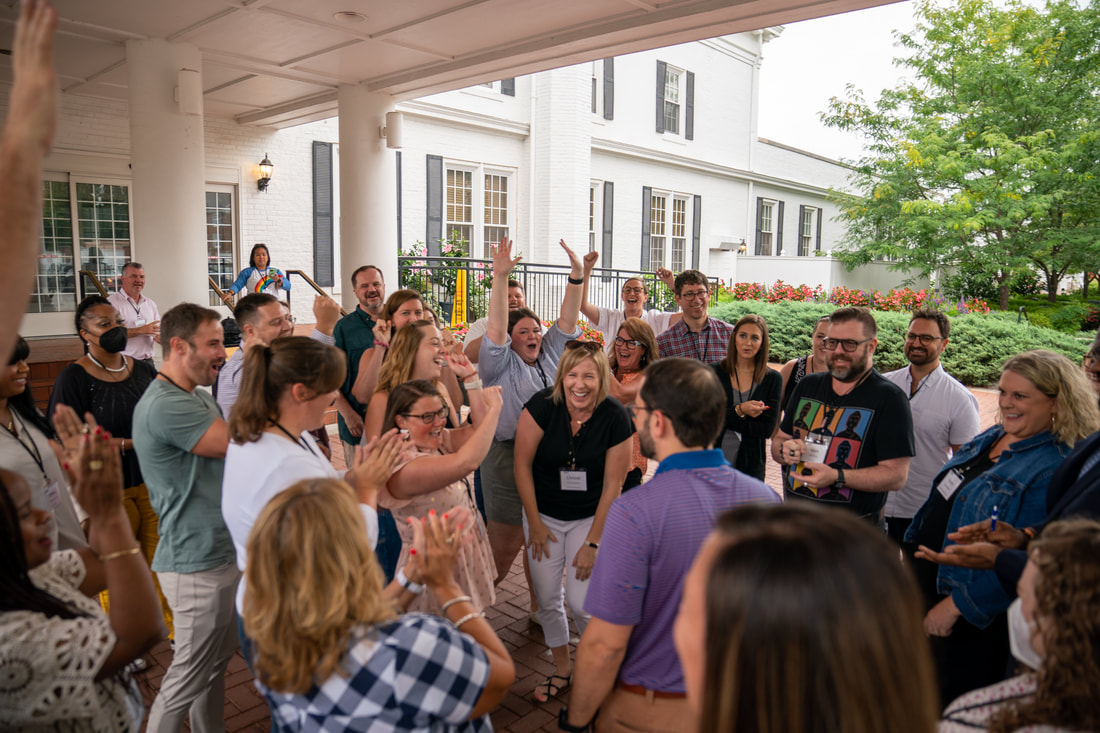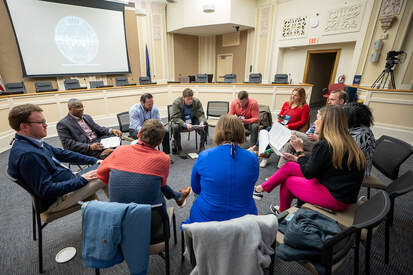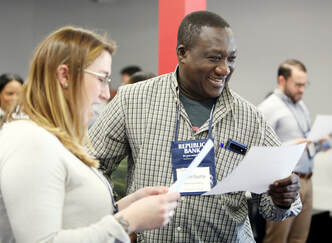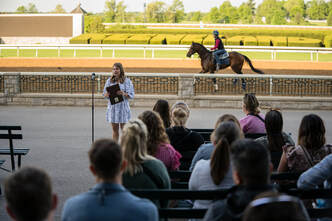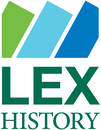Leadership Lexington
PRESENTED BY:
|
ABOUT THE PROGRAM:
Leadership Lexington has been operating as the premiere leadership development program for professionals in the greater Lexington area for more than 40 years. With a competitive application and selection process, the program allows just fifty class members annually. Leadership Lexington consists of ten, informative day-sessions which are organized and hosted by local leaders. These day sessions help to broaden perspectives and provide an increased understanding of community dynamics, signature industries, and public issues. Each class completes up to four community-based projects during the duration of the program. Projects are pitched and selected by the program participants at an immersive opening retreat. |
MISSION: The program gives participants the opportunity to better understand our city and to prepare for the challenges it faces by meeting with and learning from today’s leaders. Leadership Lexington is an educational opportunity that broadens perspectives and allows participants to gain increased understanding of community dynamics and public issues.
Applications for the 2024-2025 Leadership Lexington Class are closed.
For more information about the Leadership Lexington program check out the FAQs below or contact Tyra Harbut, Director of Leadership Development, at (859) 226-1610.
For more information about the Leadership Lexington program check out the FAQs below or contact Tyra Harbut, Director of Leadership Development, at (859) 226-1610.
Who is eligible to apply?
Applicants must be employed by firms or organizations that are active members of Commerce Lexington. Non-employed community volunteers may also apply.
What is the time commitment to participate?
Leadership Lexington is an eleven-month program that starts with an overnight Orientation Retreat in August (Tentatively scheduled for August 1-2, 2024 at Boone Tavern in Berea. The program then consists of one full-day session lasting eight hours, once a month from September until June. The Orientation retreat is mandatory.
Class participants are required to attend 80% of the day sessions in order to ‘graduate’ from the program.
Each year the class will complete up to four community projects. Project work is typically completed outside of the day sessions, which makes the Leadership Lexington experience a significant time commitment.
Class participants are required to attend 80% of the day sessions in order to ‘graduate’ from the program.
Each year the class will complete up to four community projects. Project work is typically completed outside of the day sessions, which makes the Leadership Lexington experience a significant time commitment.
What is the timeline for applications?
Applications for the 2024-2025 leadership class opened on April 15 and closed on May 15. Applicants will be notified by the end of June on acceptance.
What goes into the selection process?
Once the application window closes, a Steering Committee comprised of Leadership Lexington Alumni score the applications. The program is incredibly competitive, receiving more than 100 applications annually. Multiple steering committee members score each application based on applicant background, leadership experience, reason for participation, personal insights, and letters of support. Once all applications are scored, the committee compiles the applications in order of highest to lowest score and discuss any discrepancies in scoring. The class is selected by a combination of the scores given and the discussion that follows.
The makeup of each year’s class is intended to reflect the ethnic and cultural diversity of our city.
Typically, only one individual from each organization will be accepted per year.
The makeup of each year’s class is intended to reflect the ethnic and cultural diversity of our city.
Typically, only one individual from each organization will be accepted per year.
How much does it cost?
Program cost is $2,000.
MEMBER TESTIMONIAL: |
Hear more about the impact Leadership Lexington from past participants.
|
|
|
|
MEMBER TESTIMONIAL: |
Leadership Lexington Application Tutorial
Learn from Selection Committee members about what they are looking for when they score Leadership Lexington applications. This video will provide guidance for you on each section of the application as well as answering general questions we often receive from applicants.
Learn from Selection Committee members about what they are looking for when they score Leadership Lexington applications. This video will provide guidance for you on each section of the application as well as answering general questions we often receive from applicants.
2023-24 PROGRAM SPONSORS:
PRESENTED BY:
PLATINUM SPONSORS:
Attention Leadership Lexington Alums: Help Us Stay Connected to You
The Leadership Lexington Alumni Association is ramping up! In order to make this association a success, we need all alums to send in any updated contact information. If you are a graduate of Leadership Lexington, please send your updated information via e-mail to Dawn Pope. Find out more at www.leadershiplexingtonalumni.com.
The Leadership Lexington Alumni Association is ramping up! In order to make this association a success, we need all alums to send in any updated contact information. If you are a graduate of Leadership Lexington, please send your updated information via e-mail to Dawn Pope. Find out more at www.leadershiplexingtonalumni.com.
LATEST SESSION: Leadership Lexington Class & Alumni Mark End of 2023-24 Program
 Stephanie Arnold, right, received the 2024 Leadership Lexington Distinguished Leader Award from last year’s Distinguished Leader, Phil Jun. Stephanie was part of the group project that created the Bluegrass Corporate Cares Connection, which launched a website that removes barriers to connecting local businesses to meaningful, group-friendly volunteer opportunities at local non-profit organizations. (Photo by Mahan Multimedia)
Stephanie Arnold, right, received the 2024 Leadership Lexington Distinguished Leader Award from last year’s Distinguished Leader, Phil Jun. Stephanie was part of the group project that created the Bluegrass Corporate Cares Connection, which launched a website that removes barriers to connecting local businesses to meaningful, group-friendly volunteer opportunities at local non-profit organizations. (Photo by Mahan Multimedia)
Recap by Hannah Lindon, Commerce Lexington Membership & Engagement Admin. Associate
The culmination of a year-long journey with Leadership Lexington began with a delicious breakfast from DV8 Kitchen, graciously provided by our breakfast sponsor, McGregor & Associates. The class was then introduced to new Director of Leadership Development, Tyra Harbut, who made a few remarks and welcomed them to their reflection and graduation day.
The class then promptly moved into project reflections, led by our Steering Committee chair, Jordan Parker, and the 2023 Distinguished Leader, Phil Jun. During this time, the class reflected on their project experience, while providing recommendations for how to improve the experience for classes in the future.
Next, Luke Morgan from McBrayer addressed the class and invited them to join the Lexington Forum, a community forum that meets every month, covering a different topic of great importance to the Lexington community and presenting a bi-partisan approach to gaining more information on each topic.
After lunch, the class did leadership development and an after-action review of the program, led by Jason Cummins of Horizon Performance. The after-action review helps the Commerce Lexington staff and Leadership Lexington Steering Committee to improve the program year-after-year.
The class then moved to Transylvania University’s William T. Young Campus Center for the main event of the day – the Graduation Ceremony. We heard remarks from our Steering Committee chair, Jordan Parker; Commerce Lexington President and CEO, Bob Quick; Presenting Sponsor of the program, Billie Dollins from Community Trust Bank; and Phil Jun, the 2023 Distinguished Leader. Then, Judge Melissa Moore Murphy delivered a moving keynote speech. Stephanie Arnold, Marketing Manager at the YMCA, was awarded the Distinguished Leader Award for 2024.
To quote one of her classmates: “Stephanie epitomizes the qualifications of the Distinguished Leader Award. She has gone above and beyond to support the class projects, has been the most active member in supporting her classmates’ various professional and community service interests, and taken the lead from both an organizational and communication perspective for various initiatives.”
After the class all received their graduation certificates, they celebrated another successful year of Leadership Lexington with the Leadership Lexington Alumni Association at Graham Cottage. Amy Stout, previously the VP of Leadership Development at Commerce Lexington, received the Distinguished Alumni Award, presented by the Leadership Lexington Alumni Association.
The culmination of a year-long journey with Leadership Lexington began with a delicious breakfast from DV8 Kitchen, graciously provided by our breakfast sponsor, McGregor & Associates. The class was then introduced to new Director of Leadership Development, Tyra Harbut, who made a few remarks and welcomed them to their reflection and graduation day.
The class then promptly moved into project reflections, led by our Steering Committee chair, Jordan Parker, and the 2023 Distinguished Leader, Phil Jun. During this time, the class reflected on their project experience, while providing recommendations for how to improve the experience for classes in the future.
Next, Luke Morgan from McBrayer addressed the class and invited them to join the Lexington Forum, a community forum that meets every month, covering a different topic of great importance to the Lexington community and presenting a bi-partisan approach to gaining more information on each topic.
After lunch, the class did leadership development and an after-action review of the program, led by Jason Cummins of Horizon Performance. The after-action review helps the Commerce Lexington staff and Leadership Lexington Steering Committee to improve the program year-after-year.
The class then moved to Transylvania University’s William T. Young Campus Center for the main event of the day – the Graduation Ceremony. We heard remarks from our Steering Committee chair, Jordan Parker; Commerce Lexington President and CEO, Bob Quick; Presenting Sponsor of the program, Billie Dollins from Community Trust Bank; and Phil Jun, the 2023 Distinguished Leader. Then, Judge Melissa Moore Murphy delivered a moving keynote speech. Stephanie Arnold, Marketing Manager at the YMCA, was awarded the Distinguished Leader Award for 2024.
To quote one of her classmates: “Stephanie epitomizes the qualifications of the Distinguished Leader Award. She has gone above and beyond to support the class projects, has been the most active member in supporting her classmates’ various professional and community service interests, and taken the lead from both an organizational and communication perspective for various initiatives.”
After the class all received their graduation certificates, they celebrated another successful year of Leadership Lexington with the Leadership Lexington Alumni Association at Graham Cottage. Amy Stout, previously the VP of Leadership Development at Commerce Lexington, received the Distinguished Alumni Award, presented by the Leadership Lexington Alumni Association.
Upcoming Events: |
|
|


